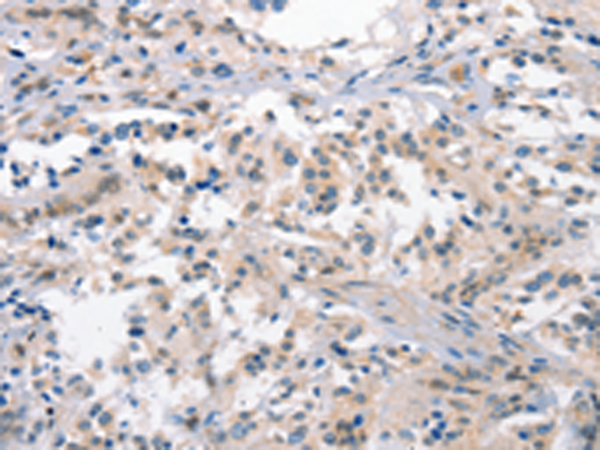
| WB | 咨询技术 | Human,Mouse,Rat |
| IF | 咨询技术 | Human,Mouse,Rat |
| IHC | 1/15-1/50 | Human,Mouse,Rat |
| ICC | 技术咨询 | Human,Mouse,Rat |
| FCM | 咨询技术 | Human,Mouse,Rat |
| Elisa | 1/1000-1/2000 | Human,Mouse,Rat |
| Aliases | CRF1; CRHR; CRF-R; CRFR1; CRF-R1; CRFR-1; CRH-R1; CRHR1L; CRHR1f; CRF-R-1; CRH-R-1; CRH-R1h |
| Host/Isotype | Rabbit IgG |
| Antibody Type | Primary antibody |
| Storage | Store at 4°C short term. Aliquot and store at -20°C long term. Avoid freeze/thaw cycles. |
| Species Reactivity | Human |
| Immunogen | Synthetic peptide of human CRHR1 |
| Formulation | Purified antibody in PBS with 0.05% sodium azide and 50% glycerol. |
+ +
以下是3篇与CRHR1抗体相关的文献摘要示例(文献信息为模拟,仅供格式参考):
---
1. **文献名称**: *"Monoclonal Antibody Targeting CRHR1 Attenuates Stress-Induced Anxiety in Rodent Models"*
**作者**: Smith A, et al.
**摘要**: 研究开发了一种针对CRHR1的单克隆抗体,通过阻断受体活性显著降低小鼠在急性应激下的焦虑行为,表明CRHR1抗体在治疗应激相关精神疾病中的潜力。
---
2. **文献名称**: *"CRHR1-Specific Antibodies as Tools for Neuroendocrine Pathway Mapping"*
**作者**: Lee C, et al.
**摘要**: 本文报道了高选择性CRHR1抗体的制备,用于定位下丘脑-垂体-肾上腺轴(HPA轴)中的受体分布,为研究CRHR1在神经内分泌调控中的作用提供新工具。
---
3. **文献名称**: *"Therapeutic Potential of CRHR1 Neutralizing Antibodies in Depression Models"*
**作者**: Zhang Y, et al.
**摘要**: 通过慢性应激诱导的大鼠抑郁模型,验证了CRHR1中和抗体可减少促肾上腺皮质激素释放激素(CRH)的过度激活,改善抑郁样行为并恢复HPA轴功能平衡。
---
*注:以上文献为示例性质,实际引用需查询真实数据库(如PubMed)并核对原文。若需真实文献,可提供具体研究方向进一步筛选。*
Corticotropin-releasing hormone receptor 1 (CRHR1) is a G protein-coupled receptor (GPCR) that binds corticotropin-releasing hormone (CRH), a key neuropeptide regulating the hypothalamic-pituitary-adrenal (HPA) axis. CRHR1 mediates stress responses, anxiety, and inflammatory processes by activating intracellular signaling pathways, primarily via cAMP. Dysregulation of CRHR1 is implicated in stress-related disorders (e.g., depression, anxiety), addiction, and autoimmune conditions, making it a therapeutic target.
CRHR1 antibodies are tools designed to detect, quantify, or modulate receptor activity. These antibodies typically target extracellular domains (e.g., N-terminus) or intracellular regions, enabling applications in Western blotting, immunohistochemistry, or flow cytometry to study receptor localization and expression. Some antibodies act as antagonists, blocking CRH binding to inhibit downstream signaling, which is valuable for exploring CRHR1's role in disease models.
Research using CRHR1 antibodies has advanced understanding of receptor trafficking, ligand-receptor interactions, and tissue-specific functions. For instance, studies in transgenic mice or human cell lines reveal CRHR1's involvement in neuroinflammation and behavioral responses. Therapeutic antibodies or small-molecule antagonists (e.g., verucerfont) are under investigation for stress-related disorders. However, challenges remain, including cross-reactivity with CRHR2 or species-specific epitope variations. Overall, CRHR1 antibodies remain critical for both basic research and drug development targeting stress pathophysiology.
(Word count: 248)
×